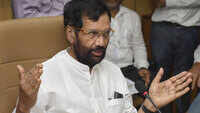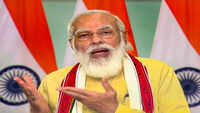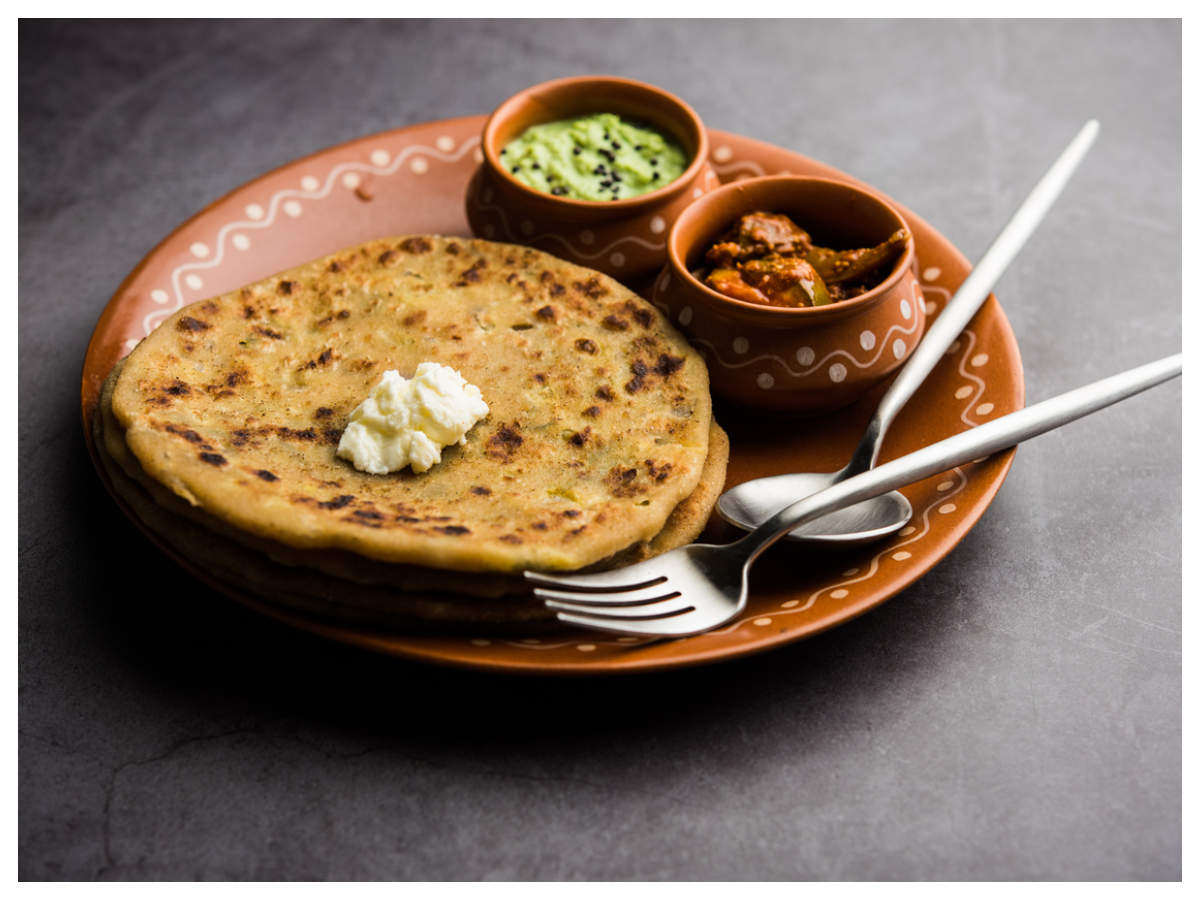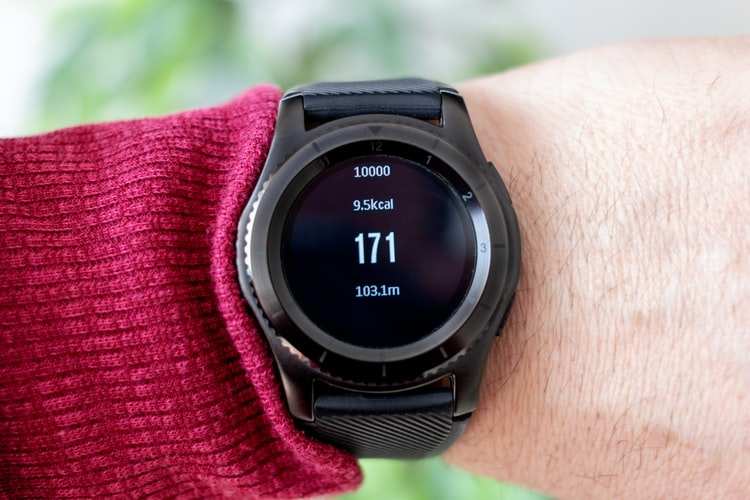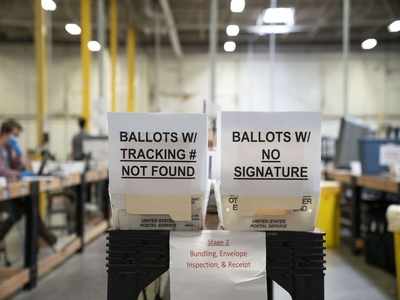
NEW DELHI: Following vice-presidential debate between Democratic Kamala Harris and Republican Mike Pence, most of Thursday saw analysis and criticism of what went down during the debate. Later in the day, President Donald Trump, who is quarantined after testing positive for Covid-19, made it clear that he won't be participating in a virtual debate.
Here are the latest developments:
1
Trump willing to debate Biden if events are postponed
US President Donald Trump is willing to debate Democratic rival Joe Biden if next week's planned event is postponed until October 22, his campaign said in a statement after the president earlier on Thursday said he would not participate in the October 15 debate. Trump's campaign also said the third planned presidential debate should be moved from October 22 to October 29.
In an interview with Fox Business Network's Maria Bartiromo, Trump had said the new virtual format announced by the Commission on Presidential Debates was not acceptable to him. "I'm not going to do a virtual debate," said the President. The virtual format was announced by the debates commission in which each candidate would appear at remote locations.
Bill Stepien, Trump’s 2020 campaign manager said in a statement that “President Trump won the first debate despite a terrible and biased moderator in Chris Wallace, and everybody knows it.
“For the swamp creatures at the Presidential Debate Commission to now rush to Joe Biden’s defense by unilaterally canceling an in-person debate is pathetic. That’s not what debates are about or how they’re done,” Stepien, who also tested positive for COVID-19 earlier this week, said.
In an interview with Fox Business Network's Maria Bartiromo, Trump had said the new virtual format announced by the Commission on Presidential Debates was not acceptable to him. "I'm not going to do a virtual debate," said the President. The virtual format was announced by the debates commission in which each candidate would appear at remote locations.
Bill Stepien, Trump’s 2020 campaign manager said in a statement that “President Trump won the first debate despite a terrible and biased moderator in Chris Wallace, and everybody knows it.
“For the swamp creatures at the Presidential Debate Commission to now rush to Joe Biden’s defense by unilaterally canceling an in-person debate is pathetic. That’s not what debates are about or how they’re done,” Stepien, who also tested positive for COVID-19 earlier this week, said.
2
Trump launches rare attack on loyal aides Pompeo, Barr
US President Donald Trump on Thursday voiced rare criticism of two of his most steadfast aides, Secretary of State Mike Pompeo and Attorney General Bill Barr, less than a month before elections.
Fuming in a telephone interview with Fox News, Trump, who has been forced off the campaign trail by a Covid-19 diagnosis, demanded that both cabinet members take action concerning the previous administration of Barack Obama.
Trump said Pompeo should find a way to release emails from Hillary Clinton, the 2016 Democratic presidential candidate, a longstanding cause for Republican activists who attack her use of a private server while secretary of state.
Trump -- who is trailing in polls to former vice president Joe Biden -- has been urging Barr to prosecute members of the Obama administration for investigating his campaign's relationship with Russia.
Fuming in a telephone interview with Fox News, Trump, who has been forced off the campaign trail by a Covid-19 diagnosis, demanded that both cabinet members take action concerning the previous administration of Barack Obama.
Trump said Pompeo should find a way to release emails from Hillary Clinton, the 2016 Democratic presidential candidate, a longstanding cause for Republican activists who attack her use of a private server while secretary of state.
Trump -- who is trailing in polls to former vice president Joe Biden -- has been urging Barr to prosecute members of the Obama administration for investigating his campaign's relationship with Russia.
3
Who won the vice-presidential debate?
Kamala Devi Harris and Mike Pence slugged it out verbally on Thursday in a snippy vice-presidential debate in course of which the incumbent’s pink eye and a fly that settled on his hair for two minutes captured the most attention.
The 90-minute sparring that partisans on both sides claimed their candidate had won did not substantially move the needle in a Presidential election where Democrats are surging into leads in nationwide polls, including in at least half dozen battleground states.
Journalist Jeremy W Peters said that there was no clear winner or loser. There was just another televised airing of differences — often acrimoniously — over President Donald Trump’s leadership and record, not that different from what Americans see on cable news every day.
“Trump should let Pence sub for him at the next debate,” said Rich Lowry, the editor of National Review.
But Pence’s tendency to evade the truth on certain questions earned him scorn from some. “Why is it that Mike Pence doesn’t seem to have to answer any of the questions asked of him in this debate?” asked Rep. Alexandria Ocasio-Cortez of New York.
Harris’ previous career as a prosecutor is always highlighted along with her ability to lash her opponent with effective one-liners.
“Biggest breakthrough sound bite: Harris wins,” wrote Mike Murphy, a Republican strategist who has been highly critical of the president and the vice president. “‘If you have preexisting condition they are coming for you.’”
But Frank Luntz, a Republican pollster, reported that in his focus group after the debate, impressions of Harris were generally unfavorable, including “evasive,” “snarky” and “unpresidential.”
The 90-minute sparring that partisans on both sides claimed their candidate had won did not substantially move the needle in a Presidential election where Democrats are surging into leads in nationwide polls, including in at least half dozen battleground states.
Journalist Jeremy W Peters said that there was no clear winner or loser. There was just another televised airing of differences — often acrimoniously — over President Donald Trump’s leadership and record, not that different from what Americans see on cable news every day.
“Trump should let Pence sub for him at the next debate,” said Rich Lowry, the editor of National Review.
But Pence’s tendency to evade the truth on certain questions earned him scorn from some. “Why is it that Mike Pence doesn’t seem to have to answer any of the questions asked of him in this debate?” asked Rep. Alexandria Ocasio-Cortez of New York.
Harris’ previous career as a prosecutor is always highlighted along with her ability to lash her opponent with effective one-liners.
“Biggest breakthrough sound bite: Harris wins,” wrote Mike Murphy, a Republican strategist who has been highly critical of the president and the vice president. “‘If you have preexisting condition they are coming for you.’”
But Frank Luntz, a Republican pollster, reported that in his focus group after the debate, impressions of Harris were generally unfavorable, including “evasive,” “snarky” and “unpresidential.”
4
Poll finds large divide between Trump’s, Biden’s supporters on whether debate should be virtual
Supporters of Trump and Biden hold widely divergent views on whether a scheduled Oct. 15 debate between the two should take place in person or virtually, according to a CNN poll of registered voters who watched Wednesday night’s debate between Pence and Harris.
In the poll, 70 percent of Trump supporters said that based on what they know about Trump’s health, the next debate should take place in person. Twenty-four percent said it should take place remotely, while 5 percent said it should not be held.
In stark contrast, only 6 percent of Biden supporters said the debate should take place in person. Sixty-two percent said it should be held remotely, while 30 percent said it should not be held.
The poll was conducted before Thursday morning’s announcement by the Commission on Presidential Debates that it would host a virtual town hall debate instead of a planned in-person event in Miami. Trump said he would not participate, while Biden’s campaign accepted the format.
In the poll, 70 percent of Trump supporters said that based on what they know about Trump’s health, the next debate should take place in person. Twenty-four percent said it should take place remotely, while 5 percent said it should not be held.
In stark contrast, only 6 percent of Biden supporters said the debate should take place in person. Sixty-two percent said it should be held remotely, while 30 percent said it should not be held.
The poll was conducted before Thursday morning’s announcement by the Commission on Presidential Debates that it would host a virtual town hall debate instead of a planned in-person event in Miami. Trump said he would not participate, while Biden’s campaign accepted the format.
5
Biden, Harris aim to tip battleground Arizona for Democrats
Veteran lawmakers and political operatives point to three main factors driving Arizona's move away from Republicans: Democratic-leaning newcomers such as Novoa; a young Latino population that was politically activated by Arizona's immigration fights of the past decade and is now reaching voting age; and the turn away from the GOP by suburban women.
The state appears to be following a pattern seen elsewhere in the West from solidly Republican to up for grabs. To varying degrees, Nevada, Colorado and New Mexico have all moved closer to Democrats since the turn of the century.
Democrats point to Brewer's decision a decade ago to sign SB1070, a law that cracked down on immigrants living in the country illegally, and immigration roundups by Sheriff Joe Arpaio. Young Latinos organized, ousting the legislator who sponsored the legislation in 2011 and Arpaio in 2016. In the process, they built a progressive infrastructure that endures.
Trump won Arizona by 3.5 percentage points in 2016 and has worked overtime to keep it in his column. He's made five trips to the state in 2020; plans for two more rallies this week were scuttled after his coronavirus diagnosis.
Since 1952, a Democrat has won Arizona only once _ Bill Clinton in 1996. But public polling has consistently shown Biden with a narrow lead.
The state appears to be following a pattern seen elsewhere in the West from solidly Republican to up for grabs. To varying degrees, Nevada, Colorado and New Mexico have all moved closer to Democrats since the turn of the century.
Democrats point to Brewer's decision a decade ago to sign SB1070, a law that cracked down on immigrants living in the country illegally, and immigration roundups by Sheriff Joe Arpaio. Young Latinos organized, ousting the legislator who sponsored the legislation in 2011 and Arpaio in 2016. In the process, they built a progressive infrastructure that endures.
Trump won Arizona by 3.5 percentage points in 2016 and has worked overtime to keep it in his column. He's made five trips to the state in 2020; plans for two more rallies this week were scuttled after his coronavirus diagnosis.
Since 1952, a Democrat has won Arizona only once _ Bill Clinton in 1996. But public polling has consistently shown Biden with a narrow lead.
6
Federal judge to revisit Ohio limit on ballot drop boxes
A voting rights group keen on expanding access to ballot drop boxes in November's election is getting a second chance to make its case, after a federal judge agreed Thursday to reconsider his earlier ruling.
U.S. District Court Judge Dan Polster in Cleveland had dismissed the A. Philip Randolph Institute's case Tuesday, because he said Republican Secretary of State Frank LaRose had issued a new order a day earlier that permitted ballot drop boxes at multiple locations within a county. That had been what the institute's lawsuit was seeking.
But LaRose's office said, by allowing drop boxes ``outside'' boards of elections, his new directive was meant to restrict them to board property just outside the building _ not to allow them off-site.
The competing interpretations left the Cuyahoga County Board of Elections in a legal bind. Polster ruled that they could move forward with their plan to set up ballot drop boxes at six public libraries scattered around the county. Lawyers for LaRose immediately ordered the county not to proceed, calling Polster's interpretation of the order ``expressly contrary'' to its intent.
U.S. District Court Judge Dan Polster in Cleveland had dismissed the A. Philip Randolph Institute's case Tuesday, because he said Republican Secretary of State Frank LaRose had issued a new order a day earlier that permitted ballot drop boxes at multiple locations within a county. That had been what the institute's lawsuit was seeking.
But LaRose's office said, by allowing drop boxes ``outside'' boards of elections, his new directive was meant to restrict them to board property just outside the building _ not to allow them off-site.
The competing interpretations left the Cuyahoga County Board of Elections in a legal bind. Polster ruled that they could move forward with their plan to set up ballot drop boxes at six public libraries scattered around the county. Lawyers for LaRose immediately ordered the county not to proceed, calling Polster's interpretation of the order ``expressly contrary'' to its intent.
7
Facebook braces for contested election, voter intimidation
Facebook said it's readied new safeguards for the 2020 US elections that have it better prepared to deal with candidates who prematurely declare victory or contest official results and the possibility of voter intimidation by alleged — and potentially armed — “poll watchers.”
In the former case, Facebook plans to halt all political advertisements once polls close on November 3, an extension of an earlier restriction on new political ads in the week leading up to Election Day.
The ban will likely last for a week, though Facebook says it could run longer if necessary. And it plans to label posts that cast doubt on election results with links to official information.
Facebook said it has been preparing for this election since 2016, when its platform was used by Russian agents trying to intervene with the US political process. It also noted that more than 200 elections have taken place worldwide since then.
On Tuesday, Facebook began banning groups that openly support QAnon, the baseless conspiracy theory that paints President Donald Trump as a secret warrior against a supposed child-trafficking ring run by celebrities and “deep state” government officials.
In the former case, Facebook plans to halt all political advertisements once polls close on November 3, an extension of an earlier restriction on new political ads in the week leading up to Election Day.
The ban will likely last for a week, though Facebook says it could run longer if necessary. And it plans to label posts that cast doubt on election results with links to official information.
Facebook said it has been preparing for this election since 2016, when its platform was used by Russian agents trying to intervene with the US political process. It also noted that more than 200 elections have taken place worldwide since then.
On Tuesday, Facebook began banning groups that openly support QAnon, the baseless conspiracy theory that paints President Donald Trump as a secret warrior against a supposed child-trafficking ring run by celebrities and “deep state” government officials.
Download
The Times of India News App for Latest World News

Coronavirus outbreak
Trending Topics
LATEST VIDEOS
More from TOI
Navbharat Times
Featured Today in Travel
Get the app
